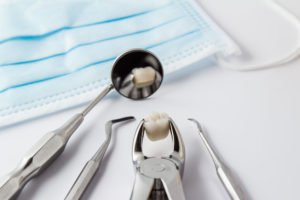 Despite their name, wisdom teeth usually only cause trouble. As the final set of molars to grow into the mouth, wisdom teeth rarely have the room they need to fit with other teeth comfortably. If wisdom teeth aren’t removed shortly after they appear during a patient’s teen years or early twenties, they often become impacted in the gums or force other teeth into misalignment. To avoid misery with your own wisdom teeth, here’s what you need to know.
Despite their name, wisdom teeth usually only cause trouble. As the final set of molars to grow into the mouth, wisdom teeth rarely have the room they need to fit with other teeth comfortably. If wisdom teeth aren’t removed shortly after they appear during a patient’s teen years or early twenties, they often become impacted in the gums or force other teeth into misalignment. To avoid misery with your own wisdom teeth, here’s what you need to know.
What Are Wisdom Teeth?
Wisdom teeth are a set of molars located in the back of the mouth. They usually grow last and don’t appear until your late teens or early twenties. Though some people are lucky enough not to experience any problems with their wisdom teeth, the majority of people need them removed to avoid serious problems like crowding, damage to nearby teeth, infection, and decay.
Do You Need Wisdom Teeth Removal?
If you receive regular dental checkups every six months, your dentist will use periodic X-rays to check the status of your wisdom teeth. Most dentists suggest wisdom teeth removal before a problem even forms in order to eliminate the potential of a more painful and complex procedure down the road. Proactive removal is recommended since wisdom teeth are easier to extract before their roots have fully developed.
However, it’s possible that you will also notice signs that your wisdom teeth are getting ready to cause trouble. You may start to experience pain in your jaw, irritation in the back of your mouth, crowding of your teeth, or frequent infection.
The Extraction and Recovery Process
A skilled oral surgeon helps to make the wisdom tooth removal process smooth and successful. Your teeth and gums are numbed with a local anesthetic and you are sedated with laughing gas or another form of medication. You’ll be asleep for the surgery, so the only thing you need to worry about is the recovery period.
Recovering from wisdom teeth removal just requires rest, ice, and whatever medication your dentist prescribes. Be sure to look out for dry sockets, which are holes in the bone that expose bones and nerves to air, food, and fluids in the mouth. These can trigger infection and pain, so notify your dentist as soon as you notice discomfort, a foul taste in your mouth, or lingering bad breath.
To learn more about the most important procedures to keep your mouth healthy and attractive, call (727) 202-4926 to make your appointment at Dental Implant Solutionz now.
